Top Smoke-Reducing Engine Oil Additives (Diesel & Petrol)
We're an affiliate
We hope you love the products we recommend! Just so you know, we may collect a share of sales or other compensation from the links on this page. Thank you if you use our links, we really appreciate it!
Table of Contents
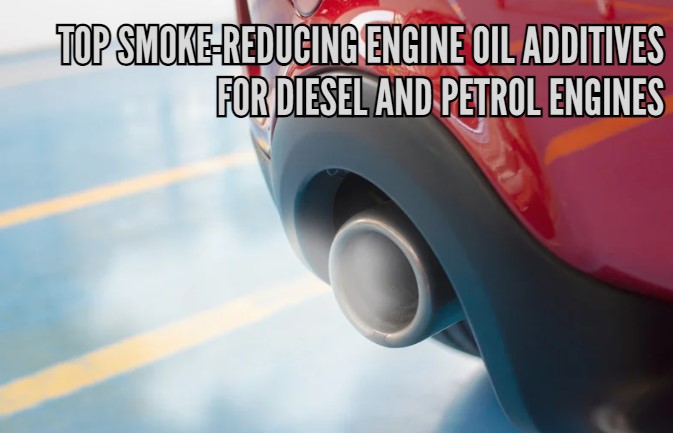
Seeing smoke behind your car is never a good sight. However, it doesn’t always mean your car is beyond repair or that you’ll face massive bills. It’s often a sign that your vehicle needs some care to perform at its best.
Blue smoke occurs when excess oil burns in the wrong places, usually in the engine’s combustion chamber. Over time, as your engine goes through heat cycles and mileage, its components can wear out and allow oil to leak where it shouldn’t, causing smoke and reduced engine performance.
Reducing Smoke with Oil Additives
Adding smoke-reducing agents to your engine oil can help prevent excess smoke. These agents thicken the oil, reducing the chance of oil-burning problems. They also create a protective layer on internal engine parts, reducing wear.
These additives also rejuvenate seals and gaskets, which keep oil, fuel, and water separate in the combustion chamber. This restores your engine’s efficiency and eliminates excess smoke.
Smoke Reduction Oil Additives: Your Options
1. JLM Stop Smoke Oil Treatment

| Product Name | JLM Stop Smoke Oil Treatment |
| Description | JLM Stop Smoke Oil Treatment is a specialized additive designed to address common issues in older engines with worn parts. It is compatible with petrol, diesel, LPG, and CNG engines that produce blue/grey exhaust smoke. This product is formulated to reduce exhaust smoke, engine wear, and oil consumption, ultimately improving engine performance. |
| Benefits | Reduces engine noise Reduces exhaust smokeImproves viscosity of the engine oil Reduces oil consumptionProlongs engine service life Enhances engine compression Compatible with various types of engine oils Safe for catalytic converters Cleans and revitalizes engine components including cylinder walls, pistons, rings, valves, lifters, and the upper cylinder area |
| Pros | Addresses multiple engine issues Suitable for older engines with worn parts Versatile and compatible with various engine types Reduces exhaust smoke and engine noise Extends engine service lifeMaintains catalytic converter integrity Cleans and revitalizes critical engine components |
| Cons | Specific benefits may vary depending on engine condition Not a substitute for essential engine maintenance and repairs |
JLM Stop Smoke Oil Treatment is a versatile solution for enhancing the performance and longevity of older engines experiencing issues like smoke emissions, increased noise, and oil consumption.
It is compatible with a range of engine types and can be easily mixed with different oils. While it offers several benefits, it’s important to note that its effectiveness may depend on the specific condition of the engine, and it should not replace necessary maintenance and repairs when required.
2. Wynn’s Stop Smoke Oil Treatment
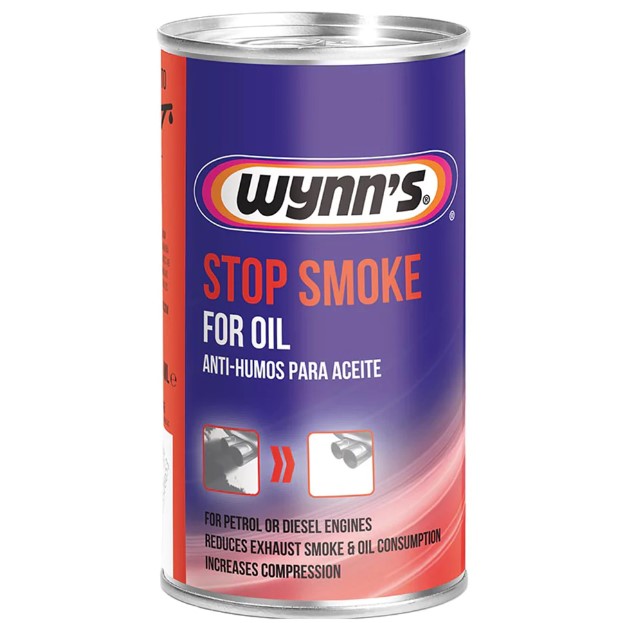
| Product Name | Wynn’s Stop Smoke Oil Treatment 325ml |
| Description | Wynn’s Stop Smoke Oil Treatment is a comprehensive solution designed to combat exhaust smoke resulting from oil burning in engines. This oil-soluble supplement is tailored for older engines with worn components, compatible with petrol, LPG, and diesel engines. |
| Features and Benefits | Enhances oil viscosity at high temperatures Seals gaps between worn engine components Improves engine compression for enhanced performance Reduces engine noise Forms a durable protective oil film under high-temperature conditions Compatible with mineral, synthetic, single, and multigrade oils |
| Pros | Addresses issues related to oil burning and exhaust smoke Suitable for older engines with worn components Versatile, compatible with various oil types Enhances engine performance and reduces noise Safe for catalytic converters, ensuring emissions system integrity |
| Cons | Effectiveness may vary based on engine condition Should not replace essential engine maintenance and repairs |
Wynn’s Stop Smoke Oil Treatment (325ml) is a powerful solution for reducing exhaust smoke in older petrol, LPG, and diesel engines.
It improves oil viscosity, seals gaps in worn engine parts, reduces engine noise, and won’t harm catalytic converters. Just add it to warm engine oil, and one can treats 3 to 6 liters.
Remember, it’s not a replacement for necessary engine maintenance.
3. Stop Smoke Oil Additive Treatment
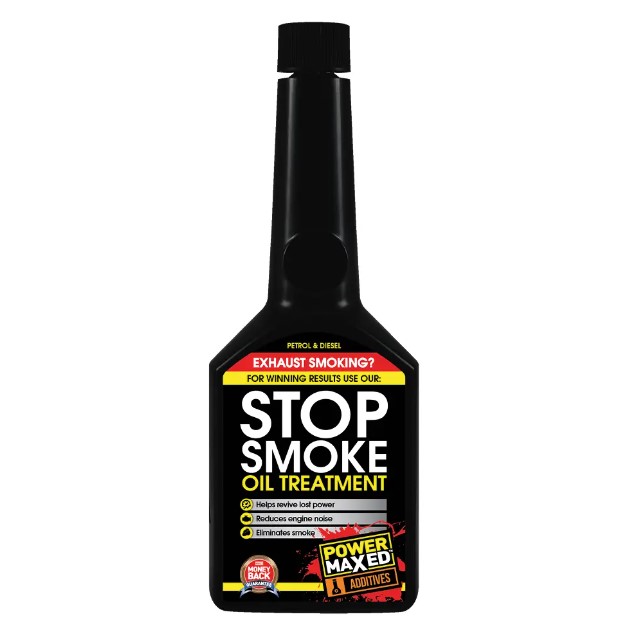
| Product Name | Stop Smoke Oil Additive Treatment 325ml |
| Description | Stop Smoke Oil Treatment is a 325ml additive designed to improve oil viscosity, creating a protective barrier that seals gaps in worn engine components. This seal reduces oil consumption, minimizes blue smoke emissions, and enhances overall engine efficiency. |
| Features and Benefits | Improved Oil Viscosity Reduced Oil Consumption Diminished Engine Noise Elimination of Blue Smoke Emissions |
| Pros | Reduces oil consumption Diminishes engine noise Eliminates blue smoke emissions |
| Cons | Limited information provided Specific benefits may vary depending on engine condition |
Stop Smoke Oil Additive Treatment in a 325ml container is formulated to enhance oil viscosity, resulting in a protective barrier that effectively seals gaps in worn engine components.
This sealing action reduces oil consumption, minimizes blue smoke emissions, and contributes to improved engine efficiency.
4. Liqui Moly Oil Smoke Stop
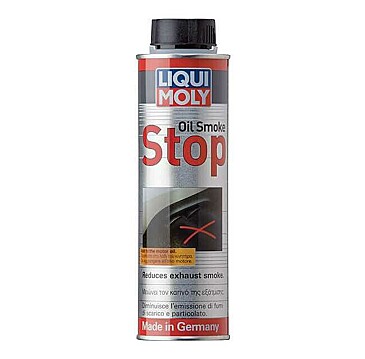
| Product Name | Engine Oil Additive |
| Description | This engine oil additive is designed to reduce oil consumption in both gasoline and diesel engines by targeting piston rings and valve guides. It prevents blue smoke and oil mist while combatting the loss of viscosity in motor oil. The result is improved engine sealing and reduced noise, along with additional protection for engines with high wear levels. Furthermore, it extends the service life of catalytic converters. |
| Features and Benefits | Reduces Oil Consumption Stabilizes Loss of Viscosity Prevents Blue, Smoky Exhaust Fumes High Shear Stability Extends Catalytic Converter Service Life Reduced Oil Consumption Improved Sealing and Reduced Engine Noise Enhanced Protection for High-Wear Engines Compatibility with Various Engines Compatible with Commercially Available Motor Oils |
| Pros | Reduces oil consumption Stabilizes loss of viscosity Prevents blue, smoky exhaust fumes Provides extra protection for high-wear engines Extends the service life of catalytic converters Suitable for all types of gasoline and diesel engines Compatible with commercially available motor oils |
| Cons | Not suitable for use in motorbikes with wet clutches Requires precise dosage (not more than 10% of motor oil) |
This Engine Oil Additive is a high-performing solution for reducing oil consumption in gasoline and diesel engines, particularly via the piston rings and valve guides.
It effectively prevents blue smoke and oil mist, combats viscosity loss in motor oil, and results in improved engine sealing and reduced noise.
This product is suitable for a wide range of engines, compatible with various motor oils, and extends the life of catalytic converters.
However, it’s important to note that it should not be used in motorbikes with wet clutches, and its dosage should not exceed 10% of the motor oil.
5. Ametech RESTORE Engine Restorer & Lubricant
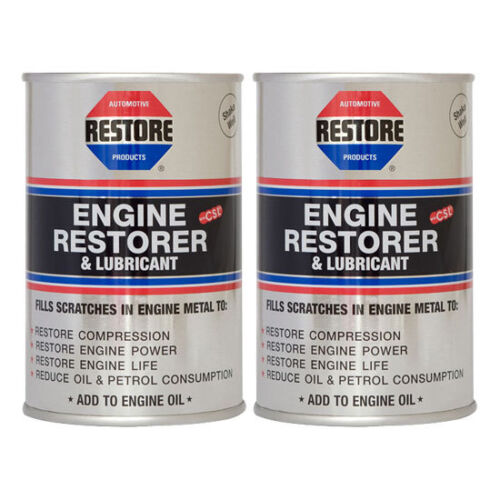
| Product Name | Ametech RESTORE Engine Restorer & Lubricant (Two 250ml Cans) |
| Description | This listing includes two 250ml cans (totaling 500ml) of Ametech RESTORE Engine Restorer & Lubricant. It’s designed to treat engines, with specific dosages for different engine sizes and mileage conditions. The product is formulated to remetalize engine surfaces, reducing wear and friction, and it offers a range of benefits for your vehicle’s engine. |
| Features and Benefits | Two Cans Dosage Variability Remetalizing Formula Wide Applicability Engine Performance Fuel Efficiency Versatile Solution Compatibility |
| Pros | Treats various engine sizes and mileage conditions Restores compression, engine power, and engine life Reduces oil and fuel consumption Addresses multiple engine issues, including blue smoke, low compression, high oil consumption, and more Suitable for a wide range of engines, including those with catalytic converters and turbochargers |
| Cons | Dosages are approximate Requires driving at least 1000 miles to complete the repair May not help with manually adjusted tappets |
This Ametech RESTORE Engine Restorer & Lubricant package contains two 250ml cans (500ml total) and is suitable for treating engines with varying sizes and mileage conditions.
It can be used as a curative treatment for older engines with more than 40,000 miles or as a preventative treatment for newer engines with up to 4 liters.
The product’s benefits include restoring compression, engine power, and engine life, as well as reducing oil and fuel consumption.
6. STP Smoke Treatment

| Product Name | STP Smoke Treatment (14.5 Fluid Ounces) |
| Description | STP Smoke Treatment is formulated to combat exhaust smoking and minimize metal-to-metal contact within your engine by creating a thick oil cushion. It’s designed to address issues like noisy valves, lifters, and oil burning caused by oil blow-by. The product contains 14.5 fluid ounces. |
| Features and Benefits | Exhaust Smoke Reduction Metal-to-Metal Contact Reduction Noise Reduction Oil Burning Reduction Engine Performance Improvement Enhanced Engine Longevity Quieter Operation Fuel Efficiency Convenient Dosage |
| Pros | Reduces exhaust smoking Mitigates metal-to-metal contact, reducing wear and tear Quiets noisy valves and lifters Decreases oil burning and engine smoking Provides a thick oil cushion for added protection One bottle treats 4-5 quarts of oil |
| Cons | Specific benefits may vary depending on the engine’s condition |
STP Smoke Treatment, available in a 14.5 fluid ounces container, is a targeted solution to reduce exhaust smoking and diminish metal-to-metal contact within your engine.
It creates a protective, thick oil cushion to address common engine issues, including noisy valves and lifters, as well as oil burning caused by oil blow-by.
Common Engine Problems and Additive Solutions
Your vehicle’s engine, like any other mechanical component, is prone to various issues over time. These problems can range from increased exhaust smoke to reduced engine performance and increased oil consumption.
Fortunately, engine additives offer effective solutions to address these common challenges. In this section, we will explore these issues and how the right engine additives can provide the necessary remedies.
1. Increased Exhaust Smoke
Problem:
One of the most noticeable engine problems is increased exhaust smoke. This is often caused by excess oil entering the combustion chamber and burning alongside fuel.
This condition, known as oil blow-by, results from wear and friction in the engine, leading to gaps between cylinder walls, piston rings, and valve guide seals.
Additive Solution:
Engine additives, specifically designed to reduce oil blow-by, can effectively combat increased exhaust smoke.
By filling in scratches and restoring worn engine surfaces, these additives reduce friction and restore the engine’s performance.
This not only addresses the issue of blue smoke emissions but also helps enhance engine efficiency.
2. Reduced Engine Performance
Problem:
Over time, engines may experience reduced performance, resulting in sluggish acceleration, decreased power output, and a general lack of responsiveness.
This can be attributed to wear and tear on engine components and the accumulation of deposits in the fuel system.
Additive Solution:
Fuel system cleaners are valuable engine additives for addressing reduced engine performance. They help remove deposits and impurities from the fuel system, enhancing fuel combustion and restoring power and responsiveness.
Additionally, oil treatments can improve engine efficiency by reducing friction, contributing to better overall performance.
3. Increased Oil Consumption
Problem:
Engines that consume excessive amounts of oil between oil changes are a cause for concern. This issue is often due to oil escaping the intended pathways and entering the combustion chamber, where it is burned along with fuel.
Additive Solution:
Oil treatments are designed to address this issue by improving oil viscosity and creating a protective barrier in the engine.
This effectively seals gaps in worn engine components, reducing oil consumption and the need for frequent top-ups. By maintaining the engine’s lubrication, these additives also extend the engine’s service life.
In conclusion, engine additives play a crucial role in resolving common engine problems such as increased exhaust smoke, reduced engine performance, and high oil consumption.
By selecting the appropriate additives and following recommended usage guidelines, car owners can effectively maintain their engines and enjoy improved performance and longevity.
Future Trends in Engine Additives: Embracing Technological Advancements
As automotive technology continues to advance, the world of engine additives is also evolving to meet the changing needs of modern vehicles.
The future of engine additives holds exciting possibilities, thanks to emerging trends and innovative technologies. Here, we explore how these trends are shaping the future of these products.
1. Advanced Formulations
The future of engine additives lies in more advanced and precisely engineered formulations. Manufacturers are investing in research and development to create additives that are tailor-made for specific engine types, making them even more effective in addressing engine issues.
2. Nanotechnology
One of the most promising trends in engine additives is the integration of nanotechnology. Nanoparticles can penetrate engine components at a microscopic level, providing enhanced protection and performance. These tiny particles can reduce friction, improve lubrication, and prevent wear and tear, leading to greater engine efficiency.
3. Environmental-Friendly Solutions
With a growing emphasis on environmental responsibility, future engine additives are expected to focus on reducing emissions. Additives that contribute to cleaner combustion and extend the life of emissions control systems like catalytic converters are gaining traction.
4. Data-Driven Additives
The incorporation of data-driven technologies is on the horizon. Some additives may be equipped with sensors and data collection capabilities to monitor engine performance in real time. This data can help users optimize additive usage and track the health of their engines more effectively.
5. Synthetic Oil Additives
Synthetic oils are becoming increasingly popular due to their superior properties. Engine additives designed specifically for synthetic oils are expected to grow in demand. These additives will work in harmony with synthetic oils to provide exceptional engine protection and performance.
6. Compatibility with Alternative Fuels
As the automotive industry explores alternative fuels, engine additives will need to adapt. Additives that work seamlessly with fuels like hydrogen, electricity, and biofuels will become essential for maintaining engine health and performance.
7. Personalized Solutions
Customizable engine additives may become a reality. Users could tailor the additives to their specific driving conditions, engine types, and performance requirements, creating a more personalized and efficient solution.
8. Smart Dispensing Systems
Automated systems that dispense engine additives at optimal times and in precise amounts could become a reality. These systems would work in conjunction with vehicle onboard computers to ensure the additives are used effectively.
9. Eco-Friendly Packaging
Future trends include environmentally friendly packaging for engine additives, reflecting the overall shift toward sustainability in the automotive industry.
Endnote
In the world of automobiles, engine additives are the unsung heroes, offering effective solutions to common engine problems. Whether you’re dealing with increased exhaust smoke, reduced engine performance, or high oil consumption, these specialized additives have your back.
By addressing issues like oil blow-by, friction, and deposit build-up, engine additives provide a cost-effective means of restoring your engine’s health and vitality. They not only reduce smoke emissions but also enhance engine performance, reduce oil consumption, and prolong the engine’s service life.
So, the next time you notice your engine struggling, don’t fret. Consider the power of engine additives, your secret weapon to keep your vehicle running smoothly, efficiently, and smoke-free. A little care today can go a long way in ensuring the longevity and performance of your beloved car.
FAQs
What can I add to my engine oil to stop smoking?
To reduce smoke emissions from your engine, you can add an engine oil treatment or stop smoke additive. These additives are specially formulated to improve oil viscosity, seal gaps in worn engine components, and prevent oil from entering the combustion chamber. They effectively address the issue of smoking exhaust caused by oil burning.
Yes, oil treatments or engine additives can effectively reduce smoking from your engine. These products work by improving oil viscosity, creating a protective barrier, and sealing gaps in worn engine components. This prevents oil from entering the combustion chamber and burning, ultimately reducing or eliminating smoking issues.
While most fuel additives are primarily designed to clean fuel systems and improve combustion, they can indirectly contribute to reducing smoke emissions by ensuring a more efficient and cleaner burn of fuel. These additives can lead to reduced emissions, including smoke, by optimizing the combustion process.
Engine oil additives, specifically designed to address oil consumption and burning issues, can effectively stop oil from burning in your engine. These additives improve oil viscosity, create a protective barrier, and seal gaps in worn engine components, preventing oil from entering the combustion chamber and burning. This, in turn, stops the problem of burning oil.
Categorised in: Uncategorised




